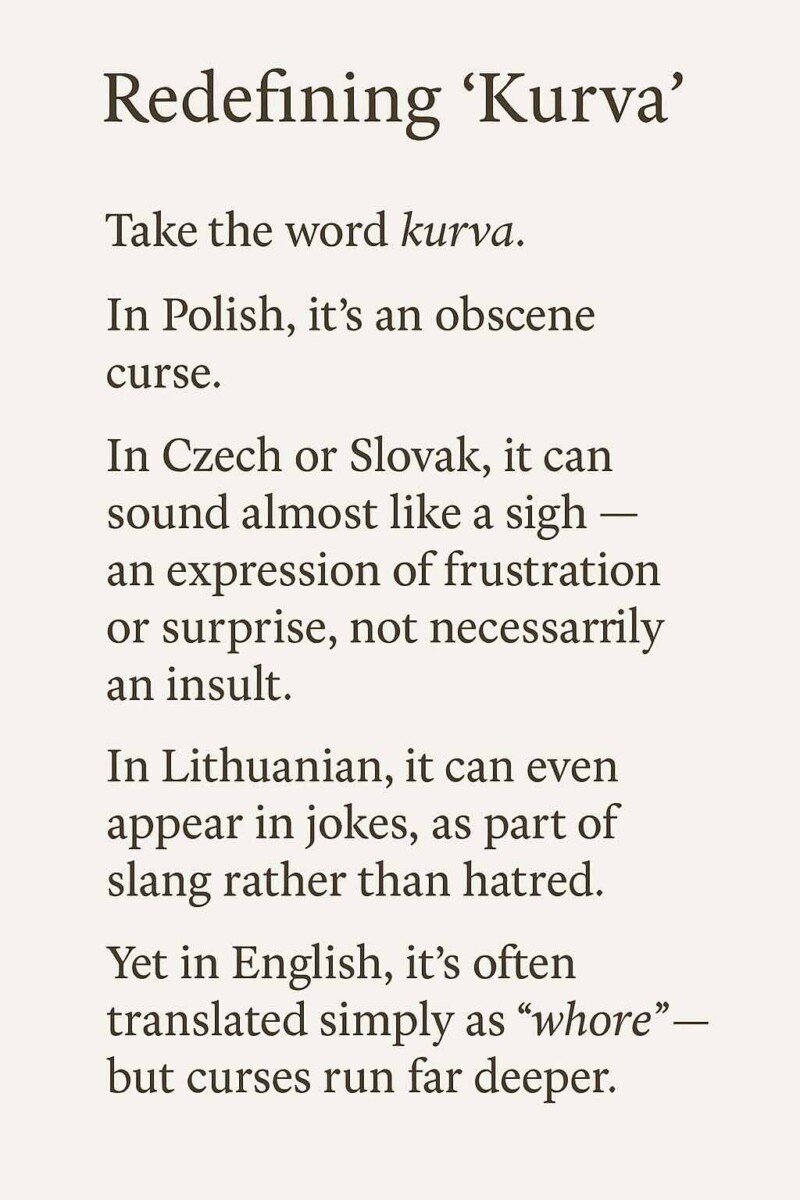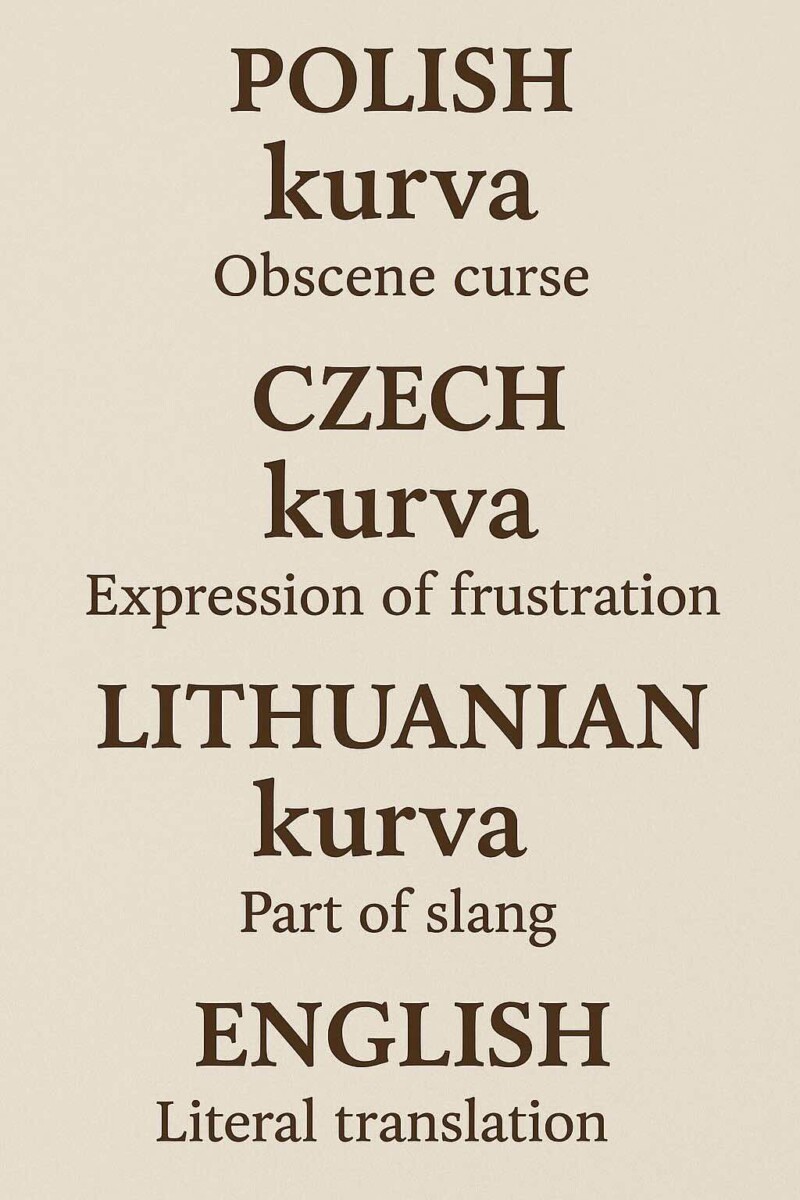From the series “The Language That Seems Not to Exist”
Author: Tymur Levitin — Founder, Director, and Head Teacher at Levitin Language School / Start Language School by Tymur Levitin
🎓 Teacher’s page → Tymur Levitin
🌍 Choose your language
18+ Linguistic Content Notice.
This article discusses taboo and obscene words for cultural-linguistic analysis only. We do not encourage their use.
1) What we’re really talking about (and why it matters)
The form you’ll meet varies by language: kurwa (Polish), kurva (Czech, Slovak, Hungarian, Lithuanian slang), курва (Ukrainian, Russian archaic), curvă (Romanian).
Core Polish meaning: a noun “prostitute” and a high-intensity interjection/curse.
Across languages, the part of speech and function shift: sometimes it’s still “prostitute,” sometimes a raw expletive (“damn!”), and sometimes a neutral-sounding intensifier (“very”).
Why this matters for translators, teachers, and visitors: literal = misleading. If you translate every instance as “whore,” you will routinely destroy the intent and misread the tone.
2) Etymology (brief, honest, unsmoothed)
- Slavic base: Proto-Slavic *kurva (forms vary in scholarly reconstructions).
- Meaning path: ‘prostitute’ → interjection/expletive (generalized).
- About Indo-European roots: proposals exist (e.g., roots meaning “to bend/turn, deviate”), but scholarship is not unanimous. What’s stable: Slavic origin and early attestation across Slavic varieties.
- Romance borrowing: Romanian curvă (“prostitute”) and curvie (“promiscuity”) are widely regarded as from Slavic.
Bottom line: the noun ‘prostitute’ is historical; the expletive/intensifier uses are later pragmatic extensions.
3) Forms, functions, examples (by language)
IPA provided for orientation; examples reflect real-world registers. Do not use these in formal contexts.
POLISH — kurwa /ˈkur.va/
- Part of speech: noun (“prostitute”), interjection/curse, discourse filler among some speakers.
- Register: very strong, highly offensive in formal/neutral settings.
- Core uses:
- Noun: Ta kobieta to kurwa. — “That woman is a prostitute.” (harsh slur when used about a person)
- Interjection (anger/pain/shock): Kurwa mać! — “God damn it!” / “For f***’s sake!”
- Discourse filler (vulgar): I kurwa, wiesz, poszedłem… — crude “like/you know” filler in some sociolects.
- Notes: The Polish K-word is one of the most salient swear words in Poland. It can appear very frequently in informal speech among some groups, but remains taboo in public/official contexts.
CZECH — kurva /ˈkur.va/
- Part of speech: noun (“prostitute”), interjection.
- Register: strong, but as an interjection can sound like a sigh of frustration rather than an attack.
- Examples:
- Noun: Ta je kurva. — “She’s a prostitute.” (insulting)
- Interjection: Kurva, zase prší! — “Damn, it’s raining again!”
- Common collocations: with ty vole (slang vocative) in informal male talk.
SLOVAK — kurva /ˈkur.va/
- Similar to Czech.
- Examples:
- Kurva, to je ťažké! — “Damn, that’s hard!”
- As noun: same caution as above.
LITHUANIAN (slang/borrowed) — kurva /ˈkur.va/
- Borrowed word; used in youth slang and jokes/banter.
- Register: vulgar, but often more playful/performative in peer groups.
- Example: Nu, kurva, vėl tas pats… — “Well, damn, same thing again…”
UKRAINIAN — курва /ˈkur.ʋɑ/
- Regionally present (esp. West); parallels Polish usage.
- Uses: noun (“prostitute”/insult), interjection (anger/disgust).
- Examples:
- Noun (insult): Вона — курва. — “She’s a prostitute.” (offensive)
- Expletive: Курва, от халепа! — “Damn, what a mess!”
- Note: Ukrainian also has its own obscene lexicon; курва is often felt as Polish-colored in tone.
RUSSIAN — курва /ˈkurvə/ (archaic/regionally marked)
- Historically present via Polish; today marked/archaic vs. commonplace блядь (another taboo term).
- Possible as stylized insult or in specific subcultural registers.
HUNGARIAN — kurva /ˈkurvɒ/
- Crucial shift: in Hungarian it survives strongly as an intensifier.
- Means: “very / damn / f***ing (intensifier).”
- Examples:
- Kurva jó! — “F***ing great!” (lit. “whore good,” but idiomatically “very good”).
- Kurva hideg van. — “It’s f***ing cold.”
- Note: Also a noun “prostitute,” but the intensifier use is extremely common in informal speech.
ROMANIAN — curvă /ˈkur.və/ (sing.), curve /ˈkur.ve/ (pl.)
- Core meaning: prostitute (n.), strongly offensive as an insult.
- Related: curvie — promiscuity.
- Register: taboo/slur when used about a person.
4) What goes wrong in English (and how to fix it)
Mistake #1 — “Translate it as ‘whore’ every time.”
- Works only when the word is used as a noun about a person — and even then it’s a loaded slur.
- Fails completely when the word functions as an interjection (Polish/Czech/Slovak) or intensifier (Hungarian).
Mistake #2 — “Translate it as ‘fuck’ every time.”
- Sometimes the emotional temperature matches (anger, pain).
- But the social meaning can differ: a sigh, a comic groan, a crude filler.
Safer mapping (function → English rendering)
- Interjection (anger/pain/shock): “Damn it!”, “For God’s sake!”, “Bloody hell!” (UK), or, in gritty contexts, “F***!”
- Intensifier (Hungarian): “really/so/super/very” (neutral) or “damn/freaking” (colloquial), or “f***ing” (explicit).
- Noun (about a person): “prostitute” (neutral literal), “slut/whore” (slur — avoid unless quotation/authenticity is required).
Translator’s rule: translate the function, not just the word.
Ask: Is it naming a person? Shouting pain? Coloring degree? Performing camaraderie?
5) Micro-pragmatics: tone, face, and solidarity
- In Polish/Czech/Slovak, the interjection can signal shared frustration (team loses, machine breaks). It’s not always aimed at someone.
- In Hungarian, intensifier use can be almost neutral pragmatically among friends (Kurva jó film! ~ “Such a good movie!”).
- In Romanian/Polish as a noun, it’s a heavy insult/slur; using it about a person is aggressive.
Bottom line: identical letters, different social contracts.
6) The “curve” digression — useful, if you present it honestly
No, kurva/kurwa and curve are not etymological cousins.
But the phonetic coincidence helps learners remember how meaning can “bend.”
- English curve ← Latin curvus “bent, arched.”
- In modern English, curves can mean a woman’s bodily shape (a dictionary sense).
- Romanian curvă (prostitute) is from Slavic, not Latin; the similarity to curve is accidental.
- The coincidence is still pedagogically useful: one “bends” form (curve), the other “bends” norms (kurva/kurwa).
Use this only as a memory hook, never as “proof.”
7) Comparative quick-table (for teachers, guides, translators)
| Language | Spelling | IPA | Core grammatical use | Everyday function | Register | Example → Safer English |
|---|---|---|---|---|---|---|
| Polish | kurwa | /ˈkur.va/ | noun; interjection | insult; pain/anger expletive | very strong | Kurwa mać! → “Damn it!” / gritty: “F***!” |
| Czech | kurva | /ˈkur.va/ | noun; interjection | insult; frustrated sigh | strong | Kurva, nestíhám! → “Damn, I’m late!” |
| Slovak | kurva | /ˈkur.va/ | noun; interjection | as above | strong | Kurva, to bolí. → “Damn, that hurts.” |
| Lithuanian (sl.) | kurva | /ˈkur.va/ | borrowed interjection | banter/slang | vulgar | Nu, kurva… → “Well, damn…” |
| Ukrainian | курва | /ˈkur.ʋɑ/ | noun; interjection | insult; disgust | strong | Курва, от халепа! → “Damn, what a mess!” |
| Russian (arch.) | курва | /ˈkurvə/ | noun (archaic); stylized insult | rare | taboo | Context-dependent; usually avoid |
| Hungarian | kurva | /ˈkurvɒ/ | noun; intensifier | “very / damn / f***ing” | vulgar-colloq. | Kurva jó idő! → “It’s damn nice weather!” |
| Romanian | curvă | /ˈkur.və/ | noun | prostitute (slur if used as insult) | taboo | E curvă. → “She’s a prostitute.” (insult) |
8) Teaching it responsibly (what we do in class)
- We never teach to imitate. We teach to decode.
- Rule for learners: Don’t say it. Do understand it.
- In our advanced translation & intercultural modules we train “function-first” mapping: how to mirror emotion, intensity, and intent without importing the taboo itself.
If you want the deeper dive, see:
👉 Understanding Realia in Translation: Cultural Nuances Across Languages
9) Takeaway (nothing smoothed, nothing lost)
- Polish baseline matters. Kurwa is both noun (“prostitute”) and high-power interjection; that duality seeded the cross-lingual spread.
- Same letters ≠ same function. Czech/Slovak = interjection; Hungarian = intensifier; Romanian = noun.
- Translate the function, not the letters. Otherwise you’ll mislabel frustration as misogyny or camaraderie as assault.
- Curve vs. kurva: no etymological link — but a helpful mnemonic about how meanings “bend.”
Translation can give a word a body.
It takes cultural listening to give it back its soul.

Author
© Tymur Levitin — Founder, Director, and Head Teacher of Levitin Language School
Author, linguist, translator. 20+ years teaching intercultural communication and the translation of “untranslatable” meaning.
🔗 Teacher’s Page — Tymur Levitin
🌐 Levitin Language School
🇺🇸 Start Language School by Tymur Levitin
📚 Translation & Meaning — Cultural Nuances Across Languages
📲 Telegram: @START_SCHOOL_TYMUR_LEVITIN
📞 WhatsApp / Viber: +380 93 291 34 29






















